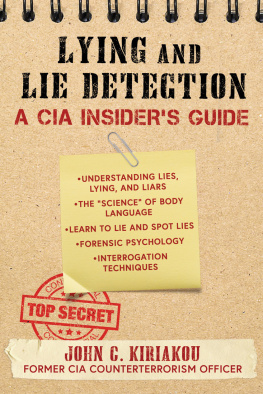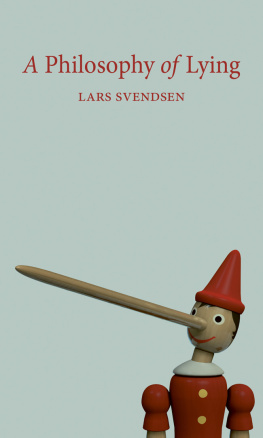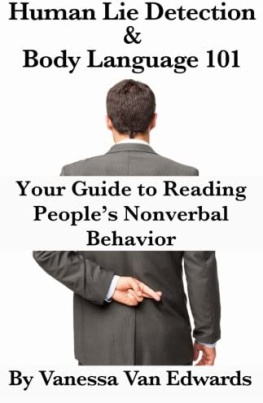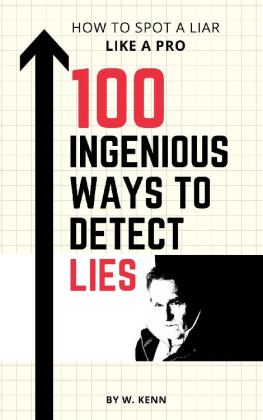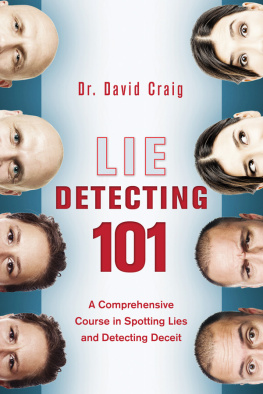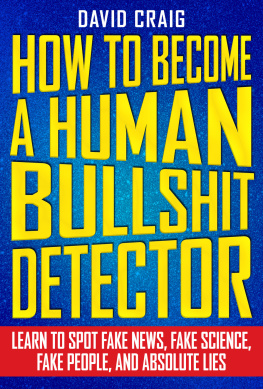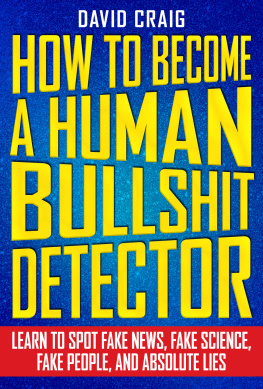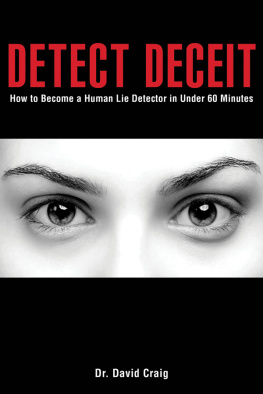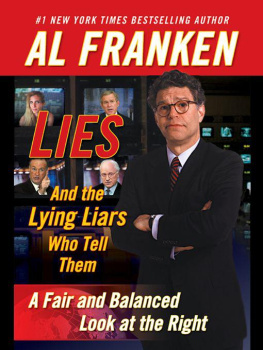

For Max
Copyright 2022 by John C. Kiriakou
All Rights Reserved. No part of this book may be reproduced in any manner without the express written consent of the publisher, except in the case of brief excerpts in critical reviews or articles. All inquiries should be addressed to Skyhorse Publishing, 307 West 36th Street, 11th Floor, New York, NY 10018.
Skyhorse Publishing books may be purchased in bulk at special discounts for sales promotion, corporate gifts, fund-raising, or educational purposes. Special editions can also be created to specifications. For details, contact the Special Sales Department, Skyhorse Publishing, 307 West 36th Street, 11th Floor, New York, NY 10018 or info.
Skyhorse and Skyhorse Publishing are registered trademarks of Skyhorse Publishing, Inc., a Delaware corporation.
Visit our website at www.skyhorsepublishing.com.
10 9 8 7 6 5 4 3 2 1
Library of Congress Cataloging-in-Publication Data is available on file.
ISBN: 978-1-5107-5611-3
eBook ISBN: 978-1-5107-5614-4
Cover design by Kai Texel
Printed in the United States of America
Authors Note
The publication of this book does not constitute an official release of CIA information. All statements of fact, opinion, or analysis expressed are those of the author and do not reflect the official positions or views of the Central Intelligence Agency or any other US Government agency. Nothing in the contents should be construed as asserting or implying US Government authentication of information or CIA endorsement of the authors views. This material has been reviewed by the CIAs Publications Review Board solely for classification.
Contents
Introduction
W HEN WE THINK OF LIES, ITS obvious that they come in very different categories. Some of them entail tremendous financial losses for investors or even for those who have bought products that were of no value but carried a high price. Financial lies can be quantified and, thanks to modern investigatory procedures, they can be exposed. Other lies relate to personal matters. Breach of promise disputes illustrate the consequences of personal dishonesty and deception. Tabloid newspapers offer us numerous accounts of the black widows who have married elderly rich men in eager expectation of their early deaths. Some of those deaths are hastened by poisonous concoctions of the women who have married for money but lack the patience to wait. When this happens, there will often be a police investigation that will explore the many lies told in connection with these love affairs. From the outright criminal we can proceed to the category of political lies. Their prevarications reveal the dishonest ambitions of politicians who are motivated by greed rather than a desire to serve the public. Sometimes they simply expose the politician who presents himself as the defender of family values as a philanderer using his exalted political position to exploit vulnerable women.
Who needs to detect lies? This is an important question. We might automatically think of police interrogators or counterintelligence officers. They obviously need to be able to separate the truth from the lies. More importantly, everyone needs to do this. In all of our interactionswhether dealing with a used car salesman, a suspicious spouse or a politician seeking our votewe face this challenge. Throughout the day, people are demanding our attention and we have to filter out spurious or dishonest messages. Even if we are not paranoid, each day is punctuated by situations that demand our attention to possible lies or deceptions.
No discussion of the art of lying is complete without a consideration of political lies. Those lies range from blatant and shameless to surprisingly complete and hidden in rhetoric. Hannah Arendt, one of the most respected political philosophers of the 20th century, and the author of Truth, Politics, and Lying, speculated about the lies of politicians . According to Arendt, mendacity contributes to the development of the totalitarian state and totalitarian leaders secure the allegiance of their citizens through coercion and manipulation. Because of the pervasive nature of lies, it appears that most politicians are not interested in truth but simply in the acquisition of power. After the Watergate scandal and a nationwide obsession with President Richard Nixons lies, candidate Jimmy Carter tried to walk around the edges of this issue. Carter proclaimed that he would never knowingly lie to the American people. That statement raised curious and confusing questions about what constitutes a lie. Does telling an untruth always constitute a lie or might it be evidence of ones stupidity? Or does it mean making a promise that turned out to be beyond possibility?
There are many reasons it is difficult to detect lies or deception in politics. One common reason stems from the failure to distinguish between a belief and a fact. If a politician expresses his belief that, for example, Mexico will pay for the border wall, that is a prediction. It may be incorrect, but it is not a lie. However, if a politician says Mexico already paid for the wall, that is a lie, since it references a fact that is not in evidence. In a similar vein, the now notorious promise of if you like your health insurance plan, you can keep it was revealed to be a lie rather than an inaccurate prediction. When it was spoken, the authors of the Affordable Care Act knew this was not going to happen. In the end, we are left with a popular association that most politicians and government officials routinely lie to us. Many people will refuse to read books written by politicians because they expect their accounts to either be self-serving or completely untruthful. Political figures prefer to spin any story in a way that advances their interest. All too often spin simply means to lie or distort reality.
It is also difficult to detect a political lie because people are wedded to their identification with a particular political party. People will listen to statements made by someone affiliated with their political party and suspend all critical thinking. If the statement is not associated with a political party it might impinge on one of the way of life disputes such as abortion and, therefore, have religious implications. Something as easily verifiable as statistics about the topic may be automatically dismissed as a falsehood without even checking.
Closely related to this category of statement is the utilization of the so-called fact checker. There is an assumption that the fact checker is not only completely objective but, more importantly, is qualified to pass judgement on matters in a multitude of disciplines. This claim is rarely plausible and people who reverentially cite a fact checker as a reason for accepting or rejecting a statement of fact are using a fallacious method of determining truth. Even less plausible is the use of a fact checker to evaluate what is, in effect, merely opinion or an evaluation of a theoretical concept.
A discussion of lying must begin with a definition. Before working on the issue of how to determine if someone is lying, we need to know what constitutes a lie. The common definition of a lie is that it is a false statement made with the intent to deceive. This definition is extremely narrow. A better definition is that a lie is a statement made by someone who does not believe it, but who directs it at someone he hopes will believe it. The first definition is based on an assumption that the statement is actually false. The second one simply requires that the person who makes that statement does not believe it although he might be wrong and the statement could actually be true.
Next page
